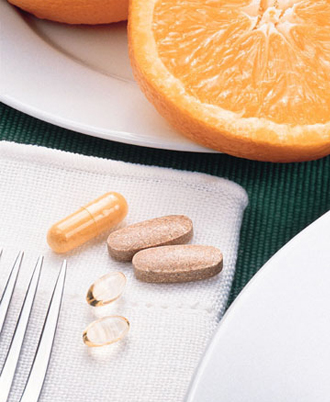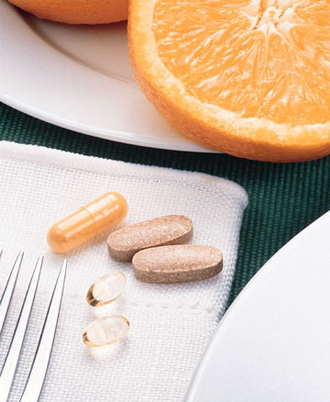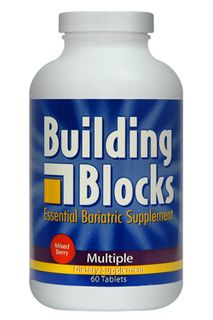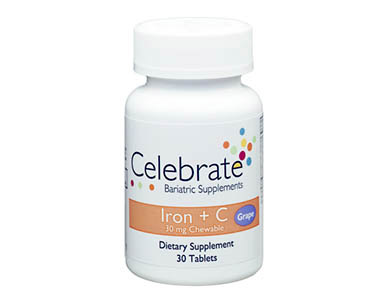 Vitamin Supplements
Vitamin Supplements
After weight loss surgery one of the most important things on our menu is to - remember is to take your vitamins. But which ones?
You'll find information in this section on:
- Supplements in a bottle
- Foods that contain the nutrients we need
- Which combinations to take together and
- Where to find them
- and even tips for remembering to take them...
Vitamin and mineral supplements are not just for good health they also help us keep that weight loss and metabolism in check.
(additional information on food nutrition can be found in "Cruisin' the Aisles")
the silver lining: answers for hypoglycemia after gastric bypass
Three years after gastric bypass surgery, things were going well. I was maintaining my weight and training for a half marathon. But then it all came to a screeching halt when my blood sugar started plummeting without warning.
The next several years were a nightmare. Trying to find a solution sent me to four doctors and several nutritionist seeking answers to an seemingly incurable problem. I was told that my blood work was normal, but I knew I was not well. Finally, I was referred to an endocrinology who diagnosed me with a severe case of Reactive Hypoglycemia (also known as Post-surgical or Postprandial Hypoglycemia).
For six years I have fought the battle of hypoglycemia with little, if any, control over my blood sugar levels. After taking a prescription medication, (Arcobose, to help with carbohydrate absorption) and adding a thyroid medication I found some relief, but I was still very sick. My life was ruled by unpredictable drops in blood sugar levels. I was unable to exercise or control my weight.
In June of 2014, I made an appointment to see Dr. Walter Pories. Dr. Pories is a re-nowned surgeon in the field of bariatrics and is currently doing research and trials on the cause and cure of post-surgical hypoglycemia. After listening to my story, he explained the "medical and scientific" reasons behind my problem and offered a solution.
He suggested that I replace my vitamin routine with 2 Silver Centrum for Women. That's all. No additional calcium or B12 is advised. I was shocked that this solution could be that simple. He suggested that it might take up to a year to see any results. However, I began to see result in just a few weeks. Nine months later, my blood sugars have stabilized. I may not be 100 percent "cured" but as long as I eat a healthy, low carb, low sugar diet, my hypoglycemia can be controled. I have discontinued the Acarbose. (I did have leg cramps for a few weeks, but they have dissipated.) I also added additional Vitamin D several months later for joint pain.
If you are suffering from post surgical hypoglycemia, don't give up....there is a solution. I recommend that you see your doctor (or look for one that will work with in to find a solution that works.) I have discovered that my thyroid medication plays a huge part in regulating my hypoglycemia and I am currently monitoring my blood work and awaiting my nine-year checkup. I highly recommended that you get regular follow-ups including blood work, as well as consult with your doctor or surgeon before changing your vitamin routine, or discontinuing any prescription medication, as well as continued monitoring of your overall health including labs and a bone density scan.
Take charge of your health. If your not well, get help or keep searching until you find the answers you need. Again, it is important to follow the advice of a medical professional, if it's working for you. If not, find a physician who can help you. Don't give up—you may not can see it right now, but there is a silver lining for you, too.
the skinny on vitamin d
 How much do you know about vitamin D?
How much do you know about vitamin D?
...it might just help you stay slim and healthy...and happy!
so here's a bright bit of info that will put a smile on your face!
In a study done at Children's Hospital in Los Angeles, it was discovered that women who had low levels of vitamin D were more than 16 pounds heavier than those who had adequate amounts. Researchers believe that vitamin D may slow down the growth of fat cells or that fat cells may trap D and inhibit their circulation.
I remember after my surgery, my Endocrinologist suggested 10 to 15 minutes of sun every day. Your face, shoulders or hands work great as vitamin D absorbers! But as we get older our skin doesn't absorb D as well as in our youth, so taking a supplement is suggested, especially for gastric bypass patients.
The recommended dose is 1,000 IU of D3 a day. But dosage really depends on your personal individual blood work and should be checked often after weight loss surgery to determine if you need extra D in your diet or supplements. Weight loss surgery surgeons are now checking for vitamin D with yearly checkups, so it is important to follow up with your health care provider.
Vitamin D helps with immune function and reduces inflammation. Its also essential for promoting calcium absorption, prevents rickets, and protects against osteoporosis.
Everyone feels better when the sun comes out... sunlight helps decrease appetite and relieves fatigue and depression.
Your body makes vitamin D from the sun, but here's how you can get Vitamin D, in addition to the sun! Just 3 1/2 ounces of salmon contains 90 percent the recommended daily intake as well as mackerel. Sardines contain 70 percent with a 2 ounce portion. Just 3 ounces of tuna contains 50 percent and one egg with the yolk contains 6 percent. Some other foods can be fortified with D, such as milk, but read those labels, yogurt and cheese are usually not.
so go grab a little sunshine...yes, you can we have many more miles to go!
to b or not to b
 I recently had some inquires about vitamins after weight loss surgery. The question was - Do you have to take vitamins after surgery?
I recently had some inquires about vitamins after weight loss surgery. The question was - Do you have to take vitamins after surgery?
...Yes, if you have had gastric bypass or any other procedure that bypass or alters your natural digestive system you must, MUST, MUST, MUST, MUST, MUST, take vitamins. It is not an option. You MUST.
Was I clear on that...
Vitamin deficiencies are life threatening...but it's an easy fix...your doctor will tell you based on blood work which you need to take each year.
Lap Band is different because it does not alter your digestive tract...but with that said, it is possible that even though your digestive tract is still in tact, you could have deficiencies. It is important to follow your surgeon's recommendations.
There are some vitamins that can not be taken together such as calcium and iron. Take some in the morning and some in the afternoon.
There are calciums that absorb better than others.
Your surgeon will most likely start you on:
- a multi-vitamin with / or additional iron (there are great multi-vitamins being offered by weight loss surgery websites, such as Build Block Vitamins, Bariatric Advantage, Unjury, Celebrate, and others which are specially formulated for bariatric needs.
- calcium citrate (citrate is better because calcium absorption needs an acid environment, which is the citrate)
- vitamin D (which absorbed with fat, (that is why they add it to milk, but I take the liquid and drop a few drops on my toast)
- vitamin B12 or B complex (B 12 can be given in shot form or under the tongue in pill form that dissolves or liquid, B complex can also be found in pill form or liquid)
- just after surgery, some people find it helpful to take Biotin, which is a B vitamin, which is thought to help with hair loss, biotin also helps boost metabolism...I'll go for that!)
- there may be others that you need to take, which is why going in for follow-ups each year is very important. Each year new discoveries are being made to improved health of weight loss surgery patients.
- along with protein supplements
NOT taking vitamins could lead to serious medical complications...
but after you get the hang of it, it will become routine. It's really not as difficult as it may sound.
You'll find out more on the blog...search for entry post under "search" on the left!
Yes we can, we have many more miles to go.
it's in the bottle
 Supplements can be as confusing as protein for bariatric patients. But there are some companies that have made it easier for us by offering supplements especially made for bariatric needs.
Supplements can be as confusing as protein for bariatric patients. But there are some companies that have made it easier for us by offering supplements especially made for bariatric needs.
If you're looking for chewables, you will be interested in finding ones that taste good, because otherwise, let's face it , if you're like me, you won't want to take them!
My two personal requirements: chewables that taste good, I'm not fond of eating chalk! Chewables because I don't like to swallow pills! OK, I'm just a kid at heart...
Here are a few of my favorites and some I've tried that might not make my "tasty" list, but you might like them. It's all a matter of preference!
First, calcium. All calcium is not created equal...for bariatrics, look for citriate, which is more "usable" for your body.
Vitamins, multi - look for the ones that include D = and maybe iron.
Celebrate is my newest favorite, but the iron is not included, but they do have a separate iron supplement. (which I'm getting ready to try).
Just after surgery I chose Flintstone Chewables with Iron. You can also choose Flintstone Complete, but I didn't think they tasted so good. Flintstone's with Iron are "tastier", but they are only available in the smaller bottles, I was told it is because they contain iron.
My chewable choices are:
- Building Blocks
- Celebrate (the flavors are so good, my only regret is I can only have a few!)
- and also Unjury is not making bariatric vitamins and calcium (not my favorite for vitamins, but they're protein is great)
- Celebrate has a multi-vitamin drink mix....yeah! My order just arrived and I'm excited to give it a try!
I'll add some others as I find them...so make sure to check back from time to time...
After a while you can switch to a pill form, (check with your surgeon on time frame). Prenatal vitamins are also recommended.
 For distributors, just google. If you order them through Bariatric TV, is helps support they're mission of education and information on bariatric surgery.
For distributors, just google. If you order them through Bariatric TV, is helps support they're mission of education and information on bariatric surgery.
Look for other brands on other bariatric websites and leave a comment to let us know your favorites...
Vitamins and other supplements such as Iron and calcium are for the long haul, if you have had gastric bypass surgery...so find a few that you like and mix them up so you don't get tired of them.
You know what they say, "Variety is the spice of life."
Vitamins don't have to be taste bad!...and now they don't...
things are greening up...spinach

Spring is in full bloom. All that warm weather calls for extra activity. With all that extra activity you'll need lots of energy. Where do you get extra energy... Spinach is a good source...
Spinach is high in iron...but did you know that iron is an integral component of hemoglobin? Hemoglobin transports oxygen from your lungs to your body's cells and is also key in energy production and metabolism. Don't know about you, but I vote for oxygen!
Iron promotes heart health, brain health, vision health and is an excellent source of folic acid and B vitamins. It supplies minerals that are essential in keeping blood pressure balanced and researches have identified over 13 compounds in spinach that function as antioxidant that prevent cancer cell replication.
Spinach supplies our body with bone-building calcium, muscle-building protein, inflammation-reducing omega-3 fatty acids, and contains sleep promoting tryptophan.
Spinach contains a powerhouse of nutrition for health and weight control. Weight loss surgery is not just about losing weight, but about regaining our health so...
Be sure to remove the stems, which can be stringy and hard to digest.
This week I've been adding spinach to everything from breakfast omelets in the morning to stuffed chicken at dinner. So as things greening up outside, green up inside with spinach...
